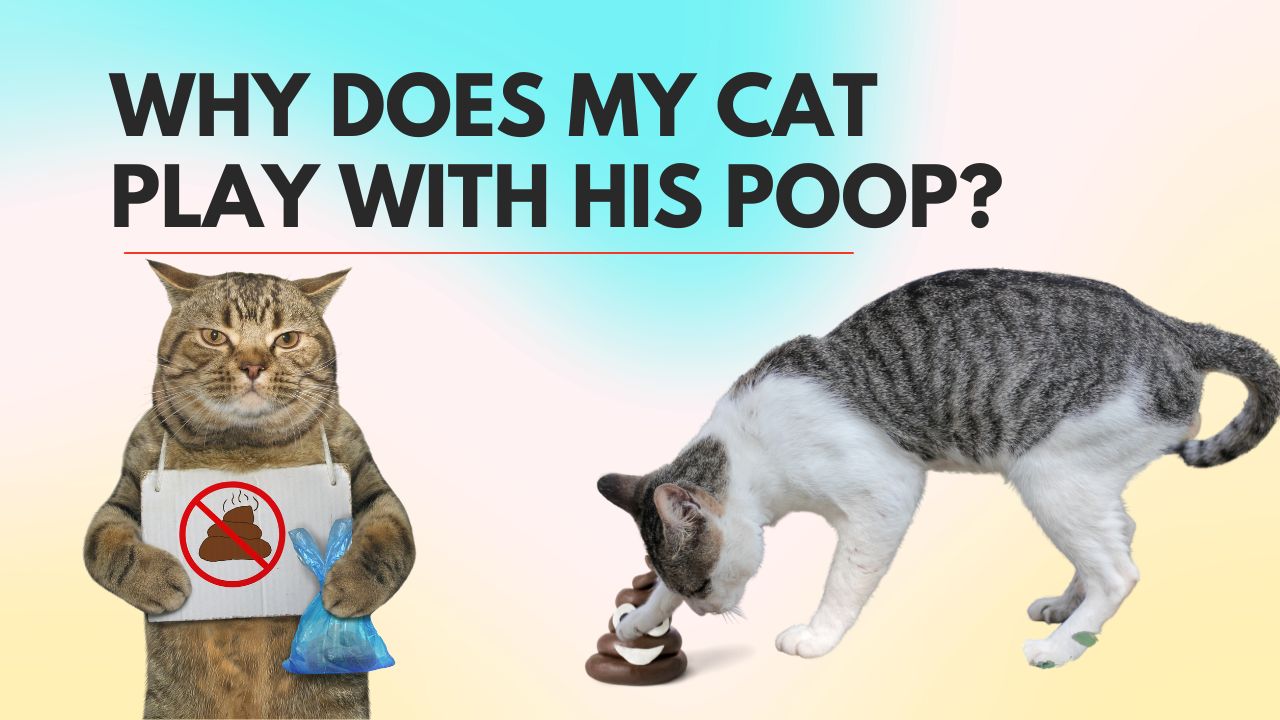
Why do cats play with their poop? It’s a common question among pet owners, especially when walking through the house and stepping into it. Understanding why your cat does this can help you learn what he’s trying to say about his mental health and his level of happiness with life. Here are some reasons why cats love to play with their poop and what it means about them.
1) To mark their territory
It’s a fact of life that cats mark their territory, and many do so in several different ways. Just think about how often your kitty stops by to leave his little calling card on your bedspread or one of your shoes. Marking through urine is one common way cats ensure you know where they live. They also can leave messages through scent and touch, like when they brush up against you to deposit hair on you or gently tap your leg as if asking for permission to use it as a scratching post.
2) To get rid of it
Many times cats play with their poop to get rid of it. Most felines will instinctively bury their waste, which can be difficult if you don’t have a yard or are in an apartment. However, since most cats only relieve themselves in one location, it’s sometimes not necessary to hide their feces. So why don’t they just put it in a litter box? One possibility is that your cat isn’t interested in using one—some felines prefer doing things a certain way and may feel that burying their feces is more natural or intuitive than depositing them into a litter box.
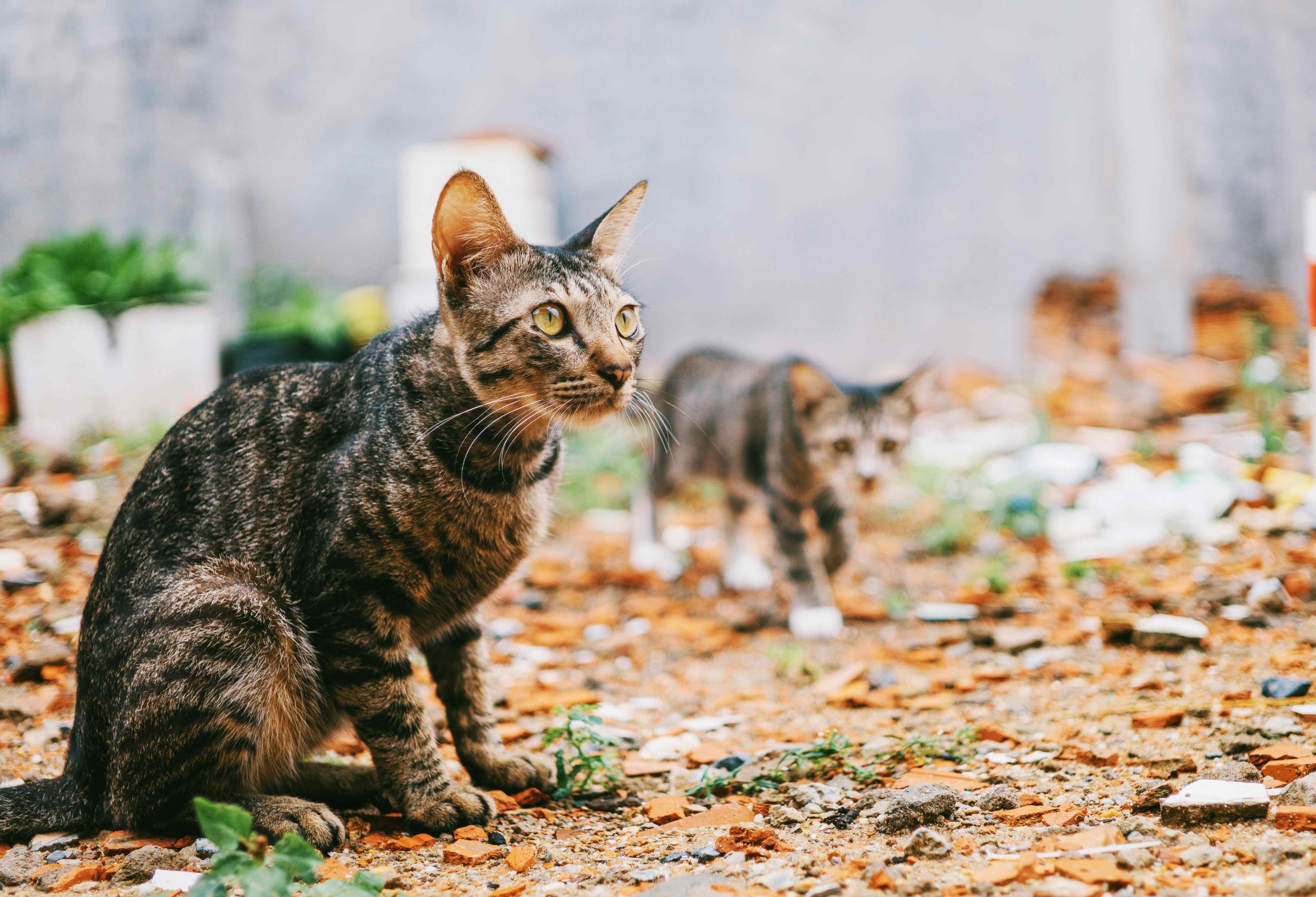
3) As an expression of contentment
If you’ve seen your cat roll around in something, she is likely expressing contentment. If a person were to do so, it would look odd—we don’t tend to express joy or pleasure by rolling in filth. It may not seem like a big deal, but why cats decide to engage in this behavior isn’t well understood. One possible explanation is that they may be expressing a sense of contentment. Cats are spotless animals, so defecating outside of their litter box seems inconsistent with their personality types—but if they act out of happiness or comfort, we might better understand why they do what they do.
4) Out of boredom
Feline parasite infections: Your poor kitty might be bored. It’s not uncommon for cats to get parasites that can make them generally feel under the weather. When your kitty is feeling sick, he may try to relieve some of that boredom by playing around with things in his environment, like his stool.
5) To eat it
Cats are natural carnivores, and as a result, many of them derive pleasure from eating meat. Tasting and consuming their excrement is another way for cats to get protein. While most people don’t want to think about it, human children do something similar when they put their fingers or toys into their mouths after touching stinky items like dirt or smelly foods such as cheese. This behavior usually stops by age four, but your kitty will be a grown-up (and foul) forever. If you find yourself trying to keep him away from his toys, clean them once in a while or change them out so he doesn’t get used to playing with one type of dirty litter box.
6) Because they want to get your attention
It’s tough being a little kitten. With so much to explore and discover, it can be challenging for your kitty to get your attention when he needs you, especially if you’re busy doing something else. Filling up their litter box with a gift they think is too good to pass up maybe their sneaky way of getting your attention. If your cat likes playing in or around his litter box and comes running every time you fill it up for him, there’s a chance that he doesn’t quite understand where these things go once he uses them. And as cute as it is when they do it, burying their waste can cause health problems for cats since parasites live in their feces and vomit.
7) Other cats do it, so they copy them
Most cats are natural predators and will spend hours chasing down imaginary prey, so if you’re starting to notice that your feline friend is spending an excessive amount of time batting a furry mouse around your apartment, it’s good news means that he’s honing his hunting skills. The best way to ensure these skills stay sharp is to purchase a wide variety of toys and give him plenty of attention each day—preferably when you’ve just rolled out of bed from a long night at work. The more time he spends playing and practicing, the better—and more fun—his life will be when he’s suddenly saddled with a litter box to clean later on down the road.
8) Cats like seeing things move around
Many cats were born to chase small, furry prey. This means that anything that moves—bugs, birds, or a toy mouse—will pique their interest and make them want to play with it. Some cats also love watching something drop from higher surfaces; if you toss some food onto your kitchen floor, you’ll likely have a feline audience member waiting for it to fall before pouncing on it. Since cat feces is also something moving around on its own (and in your kitty’s view), they might also be enticed by it. They’re just playing!
9) A great way to practice their hunting skills
It’s actual cats who often use their litter box to practice their pouncing and hunting skills. If they can successfully catch prey in their litter box, they may be more likely to hone those skills outside of it. This could help them hunt better when given access to an outdoor environment, making them a better companion for your family if you decide that having your kitty outside is suitable for you and your lifestyle. Of course, be sure your kitty has plenty of ways to exercise all those hunting instincts inside of your home too! Please make sure there are lots of exciting toys (that also serve as prey!) around that he can hunt and stalk.
10) A harmless habit that some owners find gross
Given that they’re called cat feces, you might wonder if several things about your pet’s waste aren’t quite normal. Most felines have an affinity for burying their droppings, even with no apparent reason. If your pet doesn’t cover up after going to the bathroom, it can mean health issues are afoot. But if you notice that your cat always plays with its stool or displays other odd behaviors around elimination, don’t fret—it’s perfectly normal! The truth is that there are plenty of perfectly healthy cats who like playing with or sniffing their waste. You should be concerned only if these behaviors seem overly obsessive or compulsive; in such cases, you should talk to your veterinarian immediately.
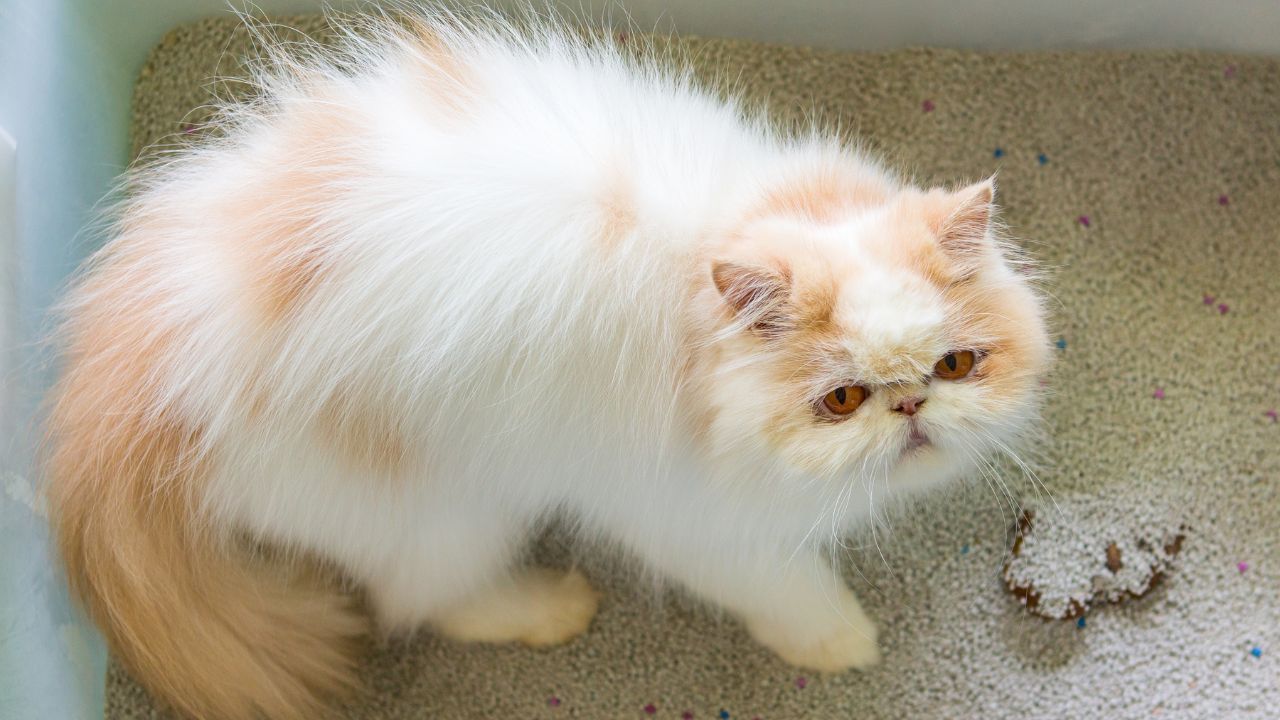
Why Does My Cat Play With His Poop? 10 Ways to Avoid
Does your cat play with his poop? This may be one of the grossest habits, yet one of the most common, you’ll find in cats today. While this habit can be annoying and unpleasant to deal with, there are steps you can take to avoid it altogether! Here are 10 tips for avoiding your cat playing with his poop.
1) Check the litter
Scooping litter boxes is another job most pet parents don’t want to (or can’t) handle. Too often, cat owners take for granted that their kitties will clean themselves, but it doesn’t always happen. If you have multiple cats in a household and everyone has their box, there may be times when one of them misses. Unfortunately, if left alone too long without being scooped out and cleaned up, waste (aka your cat’s poop) attracts other germs that multiply very quickly—this is why a litter box should be checked at least twice a day.
2) Keep him busy
Your cat likes to get his claws and paws dirty, so make sure he’s got plenty of toys to let him exercise his natural inclination toward exploration and scratching. Cats are curious creatures, so they might be more likely to leave you alone if he has plenty of things in your house that they can play with instead. Buy a cat tower or two—which will also help stop your furniture from getting scratched—and pick up some new toys for him. Once you have a few new additions for your feline friend, scatter them around your house and see which ones he likes most. If you can distract him enough with one of these toys, chances are pretty good that you won’t be dealing with poop-playing any longer.
3) Increase space between boxes
One of the most common causes of litter box issues is allowing your cat to bulk up his toiletry space. Cats like confined spaces, especially when it comes to bathrooms! Make sure there is enough room for your cat’s body, but not so much that he can have privacy on both sides of his pooping corner. If you notice severe bulkiness of your kitty’s doo-doo spot, clear out some space and see if he doesn’t go back to doing number two at a standard size. It’ll take a little while before he understands what you did – don’t be surprised if things get messy while working themselves out.
4) Control the urge
One of the most annoying habits your cat has is also one of their most common: pawing and playing with their poop. Even though it’s gross, it’s pretty easy to train your cat out of pooping on hardwood floors, so don’t panic yet. If you can curb your frustration long enough, you can keep their litter box in a place that isn’t right by an exit. This way, when they get up to leave, they’re less likely to pick up their toy for another go around.
5) Watch for signs of stress
Cats may be masters at hiding their emotions, but if they’re stressed out, you can bet they’ll let you know. Before it gets to that point, however, there are some early warning signs you can watch for. If your cat is spending too much time alone in his litter box, resisting eating, or suddenly throwing up a lot (that could mean parasites), those are signs he needs some help. This is also true of cats who suddenly start urinating outside their litter boxes, says Linder. If it’s severe enough, your vet might prescribe an antibiotic for a UTI or Feline Idiopathic Cystitis—common health issues that could be stressing out your cat.
6) Stop repetition compulsions
When cats play with their feces, they repeat a compulsive behavior that stems from anxiety. Most of these poor kitties are unaware that they’re fulfilling a deep-rooted urge and that stress and anxiety cause them to do so. Stressed cats may also overeat or have accidents to occupy their time. To curb these behaviors, try reducing your cat’s stress levels through exercise, mental stimulation, and more attention from you.
7) Eliminate boredom
One of your cat’s favorite ways to pass the time is by burying her poop. As it turns out, she’s not just doing it to hide her poo or mark her territory. Your cat likely plays with her poop because she enjoys getting rid of waste and may be carrying out instinctual behaviors from her wild, ancient ancestors. The best way to combat boredom-induced excrement play is by giving your cat plenty of enriching toys and playing with her. If your kitty has a positive relationship with you and spends ample time around humans, then a little bit of poop play probably won’t harm you or your cat—although it’s certainly not pleasant for anyone involved.
8) Clean the room more often
While cat owners know that their pets love to play with (and even eat) their poop, it’s not usually a shared desire. They are cleaning up after your cats and can get old pretty quickly. If you’re serious about avoiding it, consider investing in a tremendous automatic litter box like Litter-Robot III Open Air Automatic Self-Cleaning Litter Box or PetSafe Simply Clean Automatic Litter Box. Keeping your kitty’s bathroom area clean will make them less likely to roam around looking for an appealing spot. Remember: The best offense is a good defense!
9) Don’t worry about dirty tails
There’s a good chance that if your cat is pooping and then playing with it, he’s doing it for a specific reason. Experts tend to agree that cats do not play with poop because they think it’s funny; instead, there may be some medical problem causing pain in their abdomen. If your kitty starts acting different—they might lose their appetite or hide more than expected—take them in for a checkup. (Photo: Edyta Zielinska)
10) Find your cat a friend
A lonely cat is likelier to play with its stool, which isn’t healthy or normal. If your cat’s alone a lot, consider adopting another feline friend. After all, if your cat won’t leave their poop alone, you shouldn’t either. Bring your new buddy home today! You can also try bonding by providing high-quality toys and treats for kitty and giving them plenty of affection—toys designed for interactive play are especially effective. Finally, it’s essential to remember that there may be an underlying medical problem causing your cat’s strange behavior. A trip to the vet might help put your mind at ease and get everything back on track!
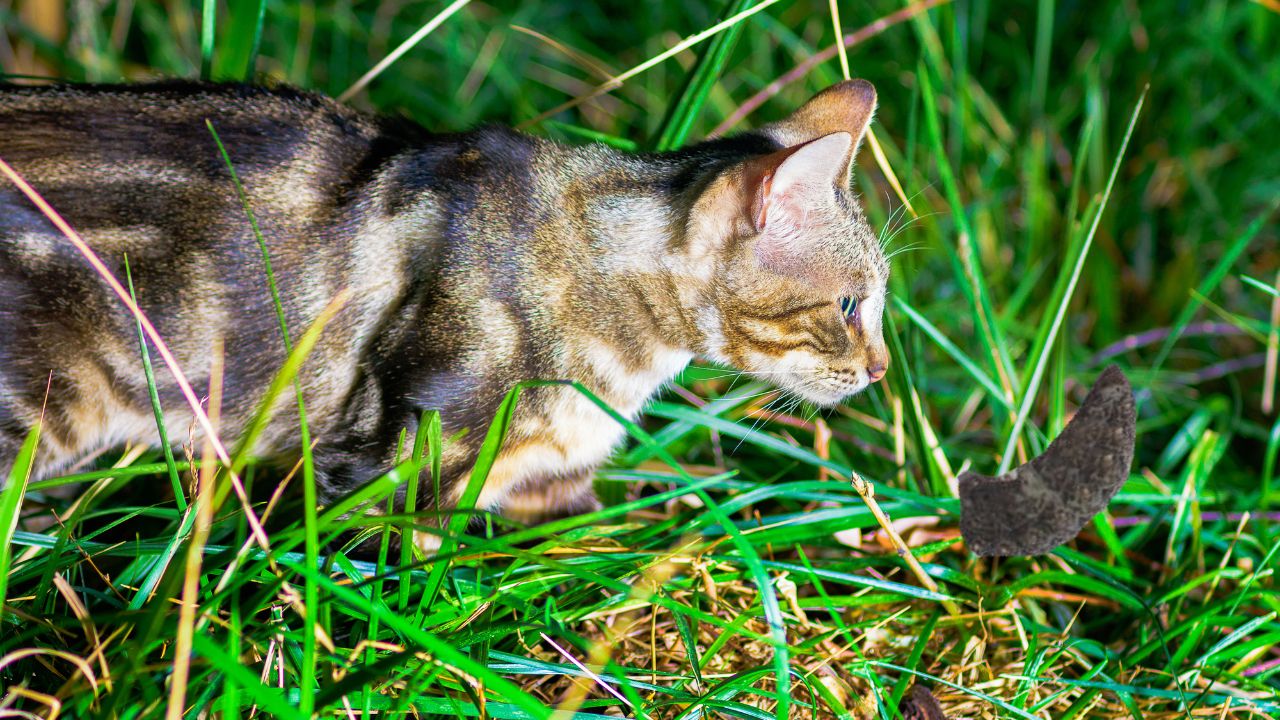
Why does my cat play with his poop? And what can I do about it?
If you’ve ever observed your cat play with his poop, you may have wondered, Why does my cat play with his poop? And what can I do about it? Cats are known to be curious and playful creatures, but there may be more to this behavior than meets the eye. Keep reading to learn more about this feline phenomenon, what it means and how you can deal with it positively.
The reasons cats might play with their poop
There are a few reasons your kitty might be playing with, rolling around in, eating, or messing up her fecal matter. First and foremost, she’s developing her hunting skills; kittenhood is just one long lesson in how to catch prey, says Carol Wells of Cat Behavior Associates. A prey animal doesn’t just give up once you’ve seen it, so cats still need to hone their hunting skills even after being adopted from a shelter or spayed. Alternatively, your feline friend could be looking for more behavioral enrichment through playtime: Try introducing toys that mimic normal prey behavior, like feathers on strings or motion-activated laser pointers.
How to stop your cat from playing with his poop
Trying to stop your cat from doing something he enjoys isn’t always easy, but there are some things you can try. To break him of a habit like playing with feces, you have to understand why he’s doing it and then find a way to satisfy that need more appropriately. Some cats enjoy covering their urine or feces to mark their territory; its texture or scent may attract other cats. Before attempting any training techniques, you’ll want to figure out exactly why your cat is behaving like he is.
Tips for when you’re unable to prevent your cat from playing with its feces
First, clean up after watching your cat play with its waste. Second, ensure that your pet has sufficient space and a litter box that is clean at all times. Third, feed your cat a healthy diet; eating high-quality food may prevent inappropriate elimination behaviors. Finally, if these suggestions are unsuccessful or don’t apply to your situation—for example, if you’re concerned about an older feline’s health—consult a veterinary professional for additional advice on how to handle the situation appropriately. For many pet owners and veterinarians alike, there’s no such thing as too much information regarding animal behavior!
Where to take him if you cannot resolve the problem on your own
You’ll want to take your feline friend to a veterinarian. A visit will also be necessary if you have concerns over your pet’s weight, blood sugar, or behavior changes. Cat owners are often shy about taking their pets to see a vet because they feel that their cats are okay and will not understand why they should be taken to a doctor. But at times, when your kitty is sick or injured, he may show symptoms you might not pick up on until later. Notice changes in behaviors such as aggression, biting, screaming, or even hiding for long periods. These could all be signs that something serious is going on inside your pet, and he should be taken care of by a vet immediately.
cat dragging poop out of the litter box
If your cat is peeing outside of its box, you may want to check on other litter boxes in your house. Often a box will smell bad, and some cats get turned off by that, so they’ll choose another place to go. Try scooping all boxes, washing them well, and then putting new kitty litter in. You may also want to consider how much space there is in each litter box. A large tub might seem like a great idea for multiple cats; however, if you only have one cat that’s larger than most, having more space available might encourage them not to use their box.
Why is my cat playing in the litter box?
Your kitty’s litter box is a surprisingly exciting place. If you want to know why cats like playing in their feces, you’ve come to the right place. Most people think that something must be wrong if a cat plays with its waste. That may be true, but there are also plenty of other reasons.
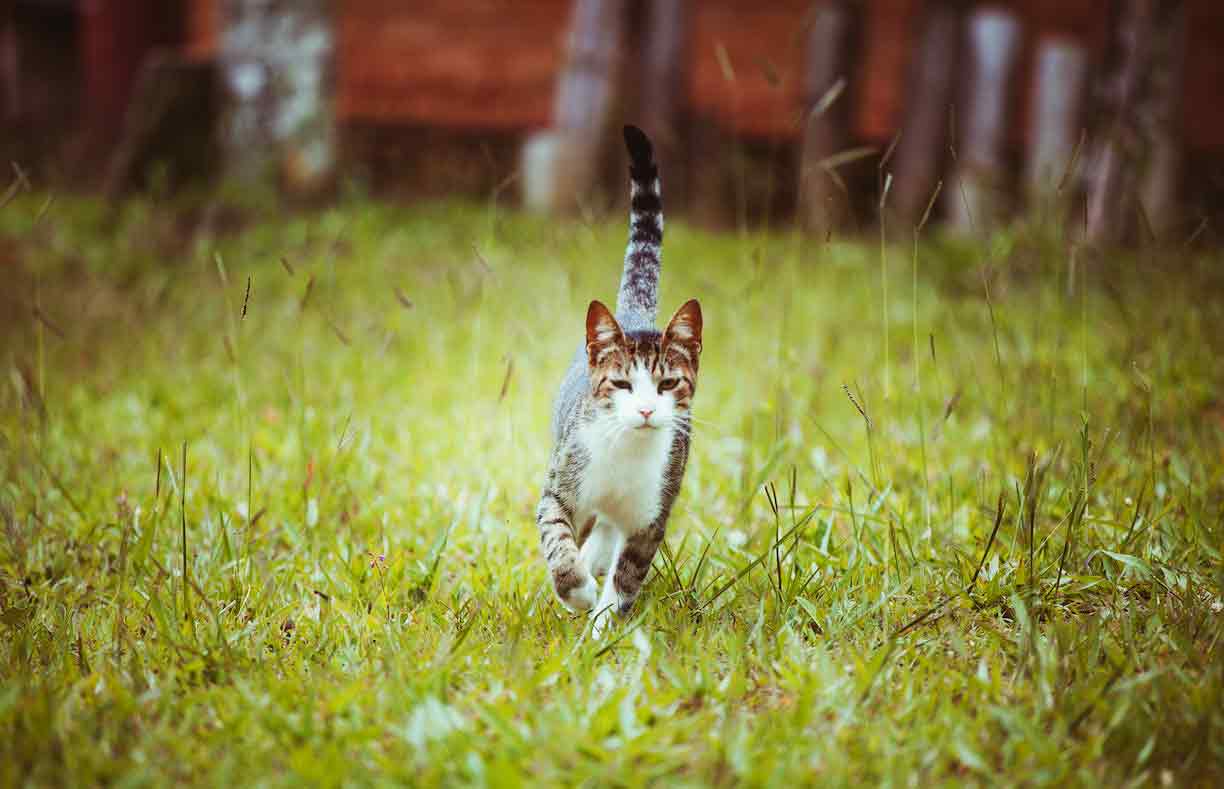
How do you get the kitten to stop playing with poop
If you’re tired of seeing your kitten playing with and even eating feces, here are some things to try before deciding whether it needs to see a vet for constipation. The most important thing is to remember that if your kitten isn’t in pain or uncomfortable, then there’s no need to bring him in for treatment. Cat poop eating is normal behavior, not something you need to worry about unless it’s paired with diarrhea or other symptoms of illness. Here are some things you can try for occasional pooping-and-playing habits: It might be time for a litter box cleaning if there’s been a change in frequency (more frequent or less frequent) or consistency (loose stool vs.
Why is my cat bringing me her poop?
There are many reasons why your kitty might be playing in and around her deposits. Understanding them is key to determining how best to stop her from doing so. Some cats may use coprophagia (cop-off-uh-gee-uh) to mark their territory, while others may find it stimulating or even mildly pleasurable. One thing is sure: If she keeps going at her waist, she could become ill, so take action now!
How do I stop my cat from playing with poop?
This is typical behavior of cats and is also perfectly natural. Cats roll around in their feces to smell more like their territory, and they will be able to mark their territory by spraying pee on objects nearby. If you want to stop your cat from playing with feces, the first thing to remember is that punishment doesn’t work for unwanted behavior—no matter how bad you want them to stop! The good news is, as long as it’s been less than 24 hours since your cat has played in its stool, there are some steps you can take right away.
Why is my kitten playing in his litter box?
Why is your kitten playing in his litter box? As kittens grow into adult cats, you’ll notice that their interaction with their litter box changes. They might use it for elimination only or start scratching around or digging at their feces and urine. One of the most common questions we get from our readers at Catster is why is my kitten playing in her litter box? While it’s pretty easy to understand why a dog would take an interest in a freshly deposited pile of waste — after all, she’s probably been trained to seek out and dig up buried treasures — people often wonder why kittens are so fascinated by stuff that came out of them.

